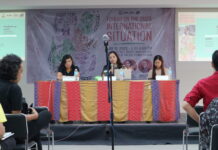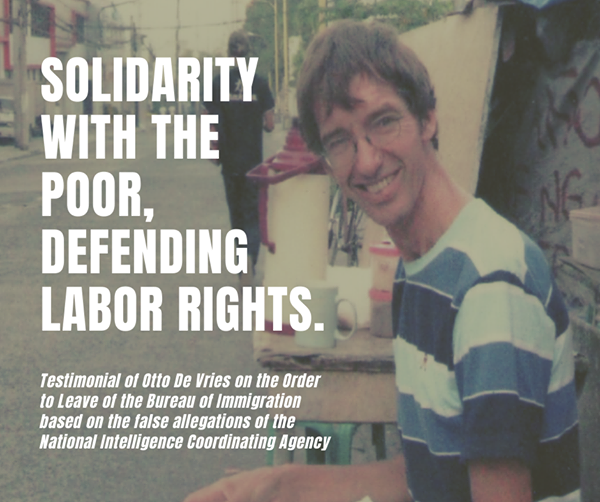Testimonial of Otto De Vries on the Order to Leave of the Bureau of Immigration based on the false allegations of the National Intelligence Coordinating Agency
I, Otto De Vries from the Diocese of Rotterdam in the Netherlands, came to the Philippines in May 1991 on the invitation of Bishop Julio Xavier Labayen, OCD, Prelature of Infanta, to do pastoral work. The Bishop’s appeal to live out the Church of the Poor had inspired me to immerse in the everyday reality of the workers. My experiences deepened as I lived with the Filipino workers and these became the source of motivation for me.
For more than 20 years, I lived in an urban poor community in the City of Pasig. After completing a course on the Filipino language and a course for welders, I worked as a welder and as a structural fitter for the first 10 years. Experiencing the reality of the workers, always as contractual, oftentimes on a contract of less than six months without guarantee of renewal, I, along with fellow workers experienced barely earning the minimum wage. For almost three years, I worked in the maintenance of a steel factory, first under an agency and later on as a direct hired. I witnessed how the steel factory workers aimed to build a union, but the factory closed.
After finishing a vocational course in electricity in 2000, I worked as an electrician for various subcontractors and for almost 10 years, in one electrical subcontractor to big construction projects. For a decade, I experienced the harsh working conditions in the construction industry. Basic labor rights such as the minimum wage, security of tenure and safe working conditions are neglected. Sharing experiences with the workers inspired me to write. I wrote about the subcontracting system in one of the last projects I had worked for. In this research I presented how the working conditions worsened on each layer of subcontracted jobs, for the readers to get a better grasp on the construction workers’ situation. Many workers that I have met have recommended that I share a copy of the research to the Ecumenical Institute for Labor Education and Research (EILER) as the institution is a well-established research NGO, known by many workers and trade unionists.
In this same period, I visited regularly a picket line of garment women workers. The management completely ignored their legitimate demands and had closed down their factory. I came to realize the exploitation in the garment industry is much worse.
Because of the strong solidarity of the workers, their picket protest lasted for 10 years. The picket witnessed some of the women workers eventually starting their own family. They won their case after six years, but they were not paid even a single centavo. After the eighth attempt of the authorities to tear down the picket, I with two workers had our “last supper” of rice and sardines before finally leaving the picket line.
In all those years, I regularly reported about my mission to Bishop Labayen, including the worsening situation of the workers. I continued doing so with his successor, Most Rev. Rolando J. Tria Tirona, OCD, DD, and presently with Bishop Bernardino Cruz Cortez. They have consistently stressed the importance of such a mission for the Church, not only sharing the experiences, but also the involvement with their struggle for social justice. This motivated me to continue.
I also became involved in the formation of church people, of laity and seminarians in order to immerse themselves with the workers. Many church people immerse with the needy in the spirit of loving service to God and wholeheartedly serving the people.
In 2014, I had an accident that prevented me to continue my work as an electrician. I temporarily went back to my country for a surgery and for recovery. A year after, EILER reached out to me on the basis of my research on the working conditions in the subcontractors in the construction industry. I became more familiar with EILER as an ecumenical service institution for the workers. With this, I have come to deeply understand that the ties between the Church and the Labor movement are indispensable. And so, I joined EILER as a volunteer researcher but more importantly to live my mission among the workers, despite my physical limitation.
The cancellation of my permanent VISA and the Order to Leave by the Bureau of Immigration is without any valid and legal cause. I was not notified of any proceedings and was not able to refute the malicious allegations of the National Intelligence Coordinating Agency (NICA) that I “engaged and was actively participating in protest rallies of Communist-Terrorist Groups (CTG) front organizations.” In the same letter of NICA to the BI, EILER is also tagged as a “CTG-affiliated non-governmental organization” (quoted by the Bureau). Contrary to the accusations of NICA, neither I nor EILER engage in acts of terrorism. Further, EILER publishes research and educational modules based on facts and concrete conditions of the workers. It does not publish propaganda or any materials that support terrorist organizations.
For almost 30 years, I was granted the privilege of being issued a permanent resident VISA. I have been living my mission in the Philippines and I have no further desire than to continue my mission among the oppressed workers.###


















